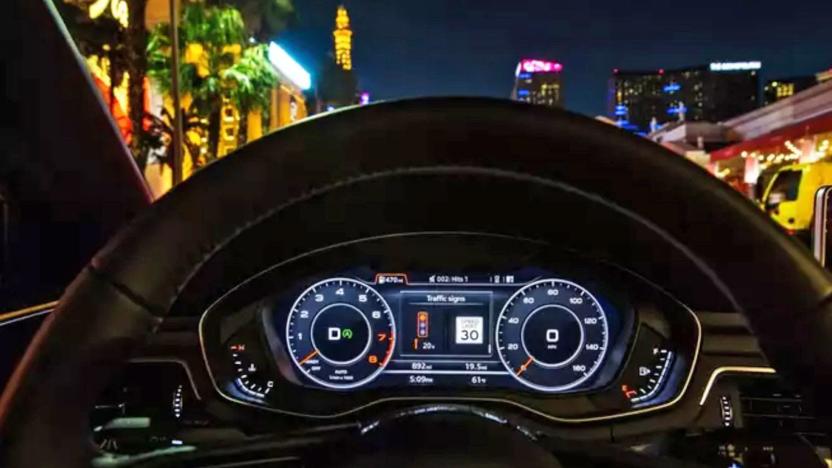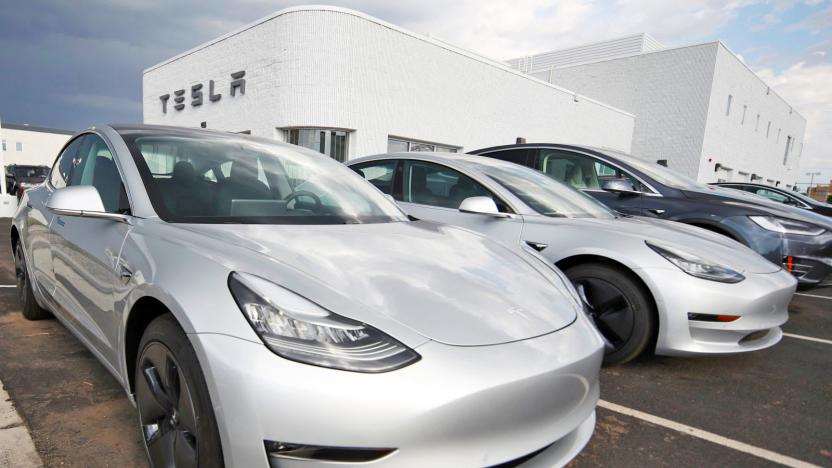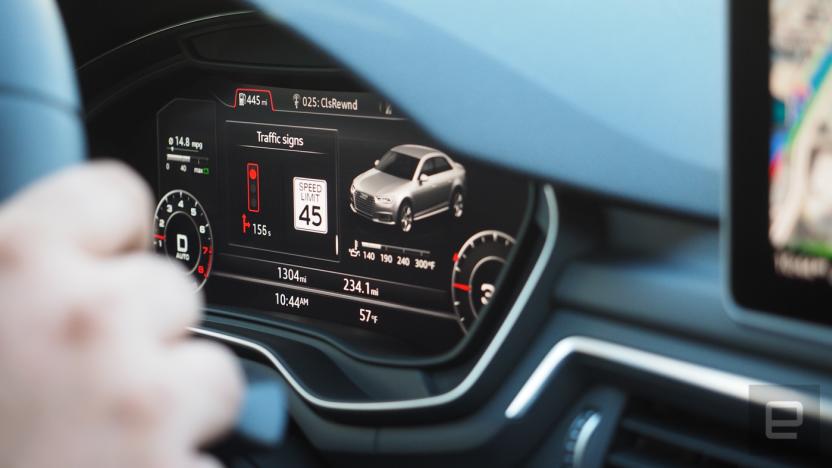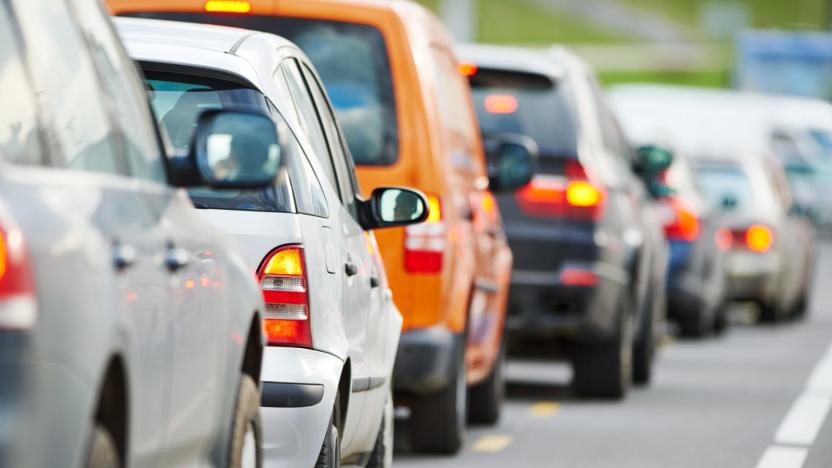trafficlights
Latest

Audi helps you avoid red lights by suggesting speeds
Audi's cars already tell you how long a red light will last, but now they'll help you avoid those red lights in the first place. It's launching the first implementation of the Green Light Optimization Speed Advisory (GLOSA), a system that provides speed recommendations to reduce the amount of time you spend at red lights. The extension of Traffic Light Information technology combines your car's position and traffic light data to calculate an ideal speed that shows up on your vehicle's instrument cluster or heads-up display. In theory, you could save time by driving slightly slower and catching an uninterrupted string of green lights.

Tesla tests Autopilot navigation for traffic lights and roundabouts
Tesla has teased that Navigate on Autopilot will gradually handle more and more driving responsibilities, but those aren't just fanciful long-term plans -- they're very much on the roadmap for the near future. In the midst of a public pitch for Navigate on Autopilot, Elon Musk mentioned that Tesla is currently testing "traffic lights, stop signs & roundabouts" in pre-release software. It's hard not to be a bit skeptical of Musk's claim that you'll soon travel to work with "no driver input at all," but this is promising if the very thought of entering a busy roundabout makes you nervous.

Audi's traffic light countdown tech comes to Washington DC
Audi's traffic light countdown has been rolling out very slowly in the US (it's active in just seven cities so far), but it just made one of its biggest expansions yet: it's now available in Washington, DC. Pull up to one of 600 connected intersections in the country's capital and your compatible Audi will tell you how long you have before the light turns green. You shouldn't be caught off-guard when an interminably long red finally changes.

AI will take control of Milton Keynes traffic lights next year
Whatever sins you've committed in life, being sandwiched in traffic in Milton Keynes is a punishment no one rightfully deserves. This modern penance should become less gruelling from autumn next year, when Milton Keynes is expected to become the first UK city (or is it a town?) to switch on an AI-powered traffic management system. A company called Vivacity Labs, with a little help from the public purse, will begin installing 2,500 cameras into traffic lights around the city this September. When live, the system will monitor major junctions and car parking spaces in a 50 square mile zone, and be tasked primarily with tackling congestion.

London tests traffic lights that stay green for cyclists
Cycling is one of the quickest ways to get across London, and soon adaptive traffic lights could make pedal-power even faster. Transport for London (TfL) is testing a system that detects groups of cyclists and, where possible, keeps the lights green for a little longer than usual. The problem being that during peak times -- for instance, the morning commute -- tons of cyclists take to the streets, causing congestion at major junctions.

Scientists investigating AI-based traffic control, so we can only blame the jams on ourselves
Ever found yourself stuck at the lights convinced that whatever is controlling these things is just trying to test your patience, and that you could do a better job? Well, turns out you might -- at least partly -- be right. Researchers at the University of Southampton have just revealed that they are investigating the use of artificial intelligence-based traffic lights, with the hope that it could be used in next-generation road signals. The research uses video games and simulations to assess different traffic control systems, and apparently us humans do a pretty good job. The team at Southampton hope that they will be to emulate this human-like approach with new "machine learning" software. With cars already being tested out with WiFi, mobile connectivity and GPS on board for accident prevention, a system such as this could certainly have a lot of data to tap into. There's no indication as to when we might see a real world trial, but at least we're reminded, for once, that as a race we're not quite able to be replaced by robotic overlords entirely.

Thieves damage South African traffic lights, reach for the juicy SIM card innards
Johannesburg, South Africa had six hundred high-tech traffic signals, each with a cellular modem and GPS chip. The idea was, if one malfunctioned, they'd call home immediately. Well, that plan isn't working out so well, because only two hundred are still in working order -- vandals ripped apart the rest to get at their SIM cards, causing traffic jams and accidents. Apparently, the government-provided cards are a ticket to unlimited free phone calls for the thieves -- at least until the individual devices are identified and their permissions revoked. The Johannesburg Roads Agency told the Mail & Guardian that the crime looks like an inside job, because only the SIM-equipped signals seem to have been targeted so far, despite looking visually identical. The damages are piling up, with the agency figuring it will require ZAR 8.8 million (roughly $1.26 million) to repair the four hundred signals currently out of order. Needless to say, the agency is looking at ways to better secure the traffic lights. We're guessing that switching to CDMA is probably off the table. Embedded SIMs, perhaps?

Audi shows off Travolution vehicle-to-infrastructure communication system (update: video!)
We've already seen Audi show off a car-to-traffic light communication system, but the automaker has stepped things up considerably with a recent demonstration of its new Travolution system, which not only lets cars communicate with traffic lights, but other cars as well. The basic idea is the same as before: to cut down on pollution and fuel-consumption by reducing idling at stop lights and, in some cases, the need to stop at all. To do that, the system relies on a combination of WiFi and 3G, which currently lets Audi's 15 test cars communicate with some 150 traffic lights in Ingolstadt, Germany -- and with each other to further avoid accidents. What's more, the system can now also even take control of the vehicles in some instances to prevent them from running a red light, and it will give drivers a heads up about the status of upcoming traffic lights -- saying, for instance, if the next light will be red or green if you continue at your current speed. As if that wasn't enough, the system also helps keep track of traffic jams, and Audi has even thrown in online payment at gas stations and parking garages for good measure. Head on past the break for the complete press release. Update: Video after the break! [Thanks, Christopher]

IBM seeks patent for intelligent traffic lights
In the great pantheon of things unlikely to happen, this IBM idea ranks pretty highly, but that doesn't necessarily make it a bad one. Big Blue has applied for a patent covering a sophisticated new traffic lights system, which judges how long cars have to wait and sends them ominous-sounding "stop-engine notifications" when the pause is long enough to make switching off optimal. This is done by communicating with queuing vehicles and collecting their positional data, and subsequent start-engine notices are also distributed intelligently, as the first car in the queue gets it earlier than the second and so on right to the back. We don't know how many dudes would abide by the instructions of a lightbox up in the sky, but it's still a neat little concept -- maybe we'll see it in action when hovercars go mainstream. [Thanks, Yuka]

LED traffic lights don't melt snow, do cause accidents
A number of cold weather American states are reporting their dismay at finding out that LED traffic lights are so energy efficient that they do not produce enough excess heat to dissipate any snow that covers them. It turns out, perhaps in an homage to bad engineering everywhere, that the inefficiency of incandescent light bulbs was previously relied upon to keep traffic signals unimpeded. The new LEDs do not achieve the same effect, which has resulted in a few accidents and even a death being blamed on obstructed traffic lights. Feel free to apply palm to face now. It's not all gloomy, though, as the majority of people are said to treat a dysfunctional traffic light as a stop sign (how clever of them), and a tech fix is being worked on as we speak.

Art Lebedev outthinks the room with square Luxofor traffic lights
We can only imagine that at least a few staffers over at Art Lebedev Studios get paid to do nothing but conjure up ideas, because this one is just marvelous. And marvelously simple, but that's beside the point. The Luxofor traffic light concept improves upon a nearly archaic design that still relies on spherical fixtures when there's really no need. Lebedev's team asserts that using square lights backed with bright laser diodes would make better use of the available space and provide a more noticeable signal to drowsy motorists. The roar of "why didn't I think of that?" being simultaneously stated is downright deafening.[Via Electronista]

Seville readies LED traffic light switch
Taking up the gauntlet brashly thrown down a few weeks ago by Taiwan, the Spanish city of Seville has launched a diabolical scheme to replace its halogen and incandescent traffic lights with LEDs. The switch to the new system will be undertaken gradually and will cost the town nearly €2.3 million, but when complete will conserve 85% of the energy used previously. Seville plans to replace 22,170 lamps in total, which will reduce energy drain annually by 3.93 million KWh, or 800 residential homes. No word, however, on what the province plans to do about its "Barber" problem.[Via AutoblogGreen]

Taiwan switching to LED traffic lights
Taiwan, always known to one-up the global marketplace when it comes to traffic control and street lighting, has announced that within the next three years all of its traffic lights will become LED based. The country's Ministry of Economic Affairs (MOEA) has budgeted roughly NT$229 million ($7 million) for the project, which is set to begin in 2008, and will convert 420,000 traffic lights to the LED standard (350,000 have already been changed over). The MOEA claims the total savings in power consumption will be close to 85%. After the sweeping reform of its traffic signals, Taiwan will invest another NT$130 million to swap its street lights out for LED-based models. Nations of the world, the gauntlet has been thrown down.[Via Digg]

Traffic light hack keeps tabs on your system
In an attempt to communicate more clearly to people when he is "busy" on his computer, one DIY'er in Japan has created the TrafficStop, an LED traffic light that interfaces with some custom Mac software and displays information in the familiar and easy-to-read three light system, updating the lights according to a user-defined threshold. With a hack like TrafficStop, your "work" will never again be "interrupted" by "people".





